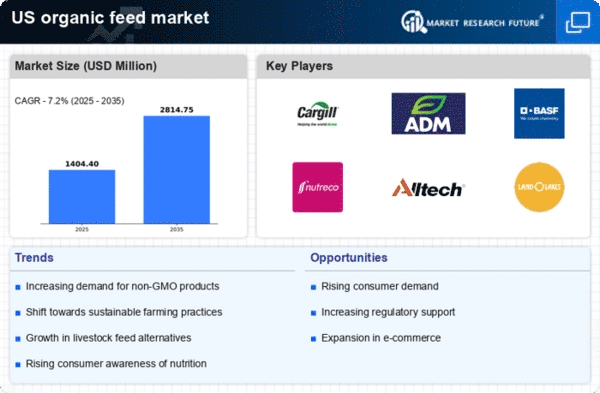Consumer Health Awareness
The increasing awareness among consumers regarding health and nutrition is a pivotal driver for the organic feed market. As individuals become more conscious of the food they consume, there is a corresponding demand for organic products, including animal feed. This trend is reflected in the growing preference for organic meat and dairy products, which in turn drives the need for organic feed. According to recent data, the organic food market in the US has seen a growth rate of approximately 10% annually, indicating a robust consumer shift towards organic options. This heightened focus on health and wellness is likely to continue influencing purchasing decisions, thereby propelling the organic feed market forward.
Sustainability Initiatives
Sustainability has emerged as a critical concern for both consumers and producers, significantly impacting the organic feed market. The push for environmentally friendly practices has led to an increase in the adoption of organic farming methods, which require organic feed. Many farmers are transitioning to organic practices to meet consumer demand for sustainable products. This shift is supported by various government initiatives aimed at promoting sustainable agriculture, which may include financial incentives for organic farming. As a result, the organic feed market is likely to benefit from these sustainability initiatives, with projections suggesting a potential increase in market size by 15% over the next five years.
Rising Livestock Production
The increasing demand for livestock products is a significant driver for the organic feed market. As the population grows and dietary preferences shift towards higher protein consumption, the need for organic livestock feed is expected to rise. This trend is particularly evident in the poultry and dairy sectors, where organic options are gaining popularity. Recent data suggests that organic poultry production has increased by approximately 20% in the last year, reflecting a broader trend in the organic feed market. This rising livestock production not only supports the growth of organic feed but also encourages farmers to invest in organic practices, further enhancing market dynamics.
Regulatory Support for Organic Practices
Regulatory frameworks supporting organic farming practices play a crucial role in shaping the organic feed market. The USDA has established stringent guidelines for organic certification, which not only enhance consumer trust but also encourage farmers to adopt organic methods. This regulatory support is essential for maintaining the integrity of the organic feed market. As more farmers seek certification, the demand for organic feed is expected to rise. Recent statistics indicate that the number of certified organic farms in the US has increased by over 5% annually, suggesting a positive trend for the organic feed market. This regulatory environment fosters growth and stability within the industry.
Technological Advancements in Agriculture
Technological innovations in agriculture are transforming the organic feed market. Advances in precision agriculture, biotechnology, and feed formulation techniques are enabling producers to create more efficient and effective organic feed products. These technologies not only enhance the nutritional value of feed but also improve the overall productivity of organic farming. The integration of technology in organic practices is likely to attract more farmers to the organic feed market, as they seek to optimize their operations. Furthermore, the potential for reduced costs and increased yields may lead to a projected growth rate of 12% in the organic feed market over the next few years.
















